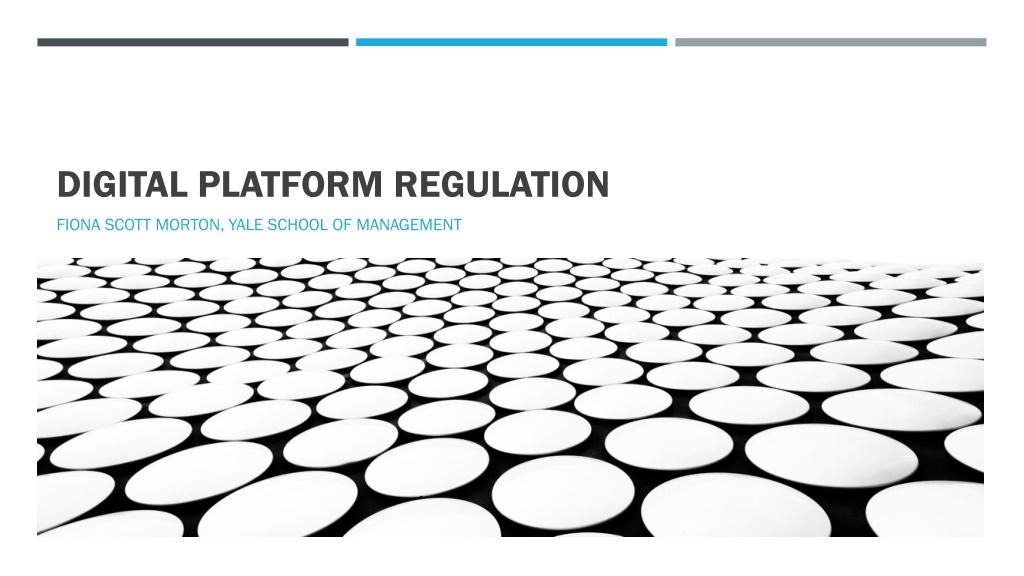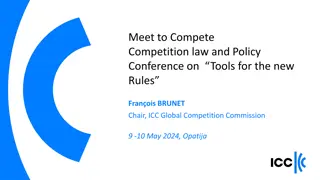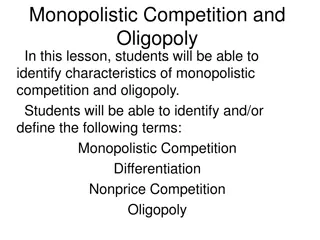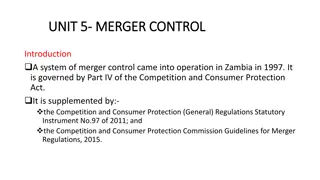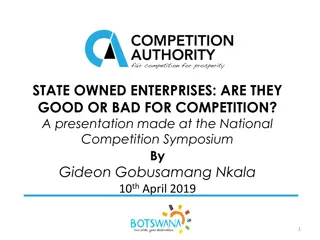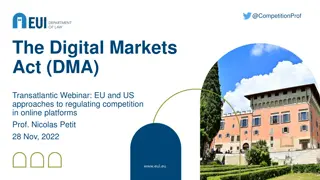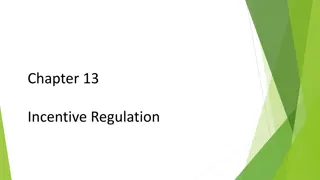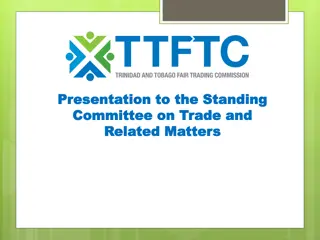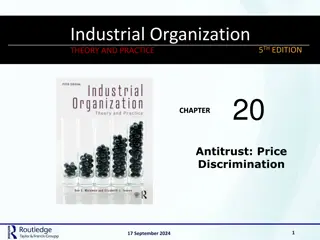Digital Platform Regulation and Competition Strategies
In the realm of digital platform regulation, Fiona Scott Morton from Yale School of Management emphasizes the need for modernization and economic analysis. The principles outlined focus on contestability, fairness, and enforcement. Solutions proposed include fostering competition in the market through interoperability and addressing entry barriers to promote a more competitive landscape.
Download Presentation

Please find below an Image/Link to download the presentation.
The content on the website is provided AS IS for your information and personal use only. It may not be sold, licensed, or shared on other websites without obtaining consent from the author. Download presentation by click this link. If you encounter any issues during the download, it is possible that the publisher has removed the file from their server.
E N D
Presentation Transcript
DIGITAL PLATFORM REGULATION FIONA SCOTT MORTON, YALE SCHOOL OF MANAGEMENT
DIGITAL REGULATION We are in exciting times However, economics is a bit behind. We stopped doing regulation in the US in 1980 We need both more research and more policy based on economic analysis The Digital Regulation Project | Tobin Center For Economic Policy (yale.edu)
PRINCIPLES Contestability / entry barriers Fairness / surplus split Consumer / small business protection Enforcement
CONTESTABILITY Network effects => competition FOR the market rather than competition IN the market Competition FOR the market is inferior Frequency of new entrants Unlikely timing of great entrant is optimal Antitrust enforcement must protect new entrant difficult All consumers pay switching costs
SOLUTION: COMPETITION IN THE MARKET Interoperability: a super a super- -tool tool of digital platform regulation Enables competition in the market Direct network effects: email, phones have interoperability standard New ISPs can enter. New phone carriers (with spectrum!) can enter Social network regulated interface / APIs Mandated for dominant firms Could be designed and managed by industry committee Overseen by regulator in background so dominant firm does not capture
SOLUTION: COMPETITION IN THE MARKET INDIRECT NETWORK EFFECTS Regulated APIs are for one side to get on to the platform On equal terms with the platform s own service App stores Mobile OS publishes the APIs necessary to run a store Rival stores can be downloaded: competition in curation and price Ecommerce Ecommerce platform publishes the APIs necessary to load storefront Ecommerce platform publishes the APIs necessary to order fulfillment
SOLUTION: COMPETITION IN THE MARKET ENTRY BARRIERS Only need one web index Mandate FRAND access to it Click and query data required for entry into search Mandate FRAND access Think about investment incentives Prohibit MFNs that restrict business model of entrant Prohibit protection / leveraging through search results
FAIRNESS - SURPLUS SPLIT Outside options: marginal versus average users The marginal user contributes very little to the platform replaceable Particularly bad when there are network effects and scale is large => Consumer s share is close to zero Thought experiment: what if all users moved together? User surplus comes from being together. If all users moved, their surplus would hardly change The platform would lose all its profits => average surplus per user is high Regulation can shift the bargaining environment to reflect user contribution
SOLUTIONS SURPLUS SPLIT Quicker than solving contestability and waiting for the result Manifests itself as quality increase as well as price decrease Examples: Search: half page reserved for non-monetized content Social networks: oversight and transparency of algorithm that generates feed (and creates anorexia, insurrection, and generally lowers quality) App developers have a right to direct contact with users Ad tech markets: transparency and quality standards
CONSUMER PROTECTION Consumer protection online raises different issues. Needs attention Group needing protection is larger than traditional consumers Person who makes jewelry part time and sells on Etsy Incorporated person who makes jewelry Incorporated person with two employees who make jewelry Independent contractor who drives in gig economy Many small businesses need just as much consumer protection as consumers
BEHAVIORAL ECONOMICS Defaults really, really matter Dark Patterns Pre-ticked radio buttons, additions to cart Unenrolling from Amazon Prime Auto-renewal Misleading / deception Cookie acceptance Only 1 room left at this price Framing Reviews Menu of choices
ENFORCEMENT Let s look at Google in the EU 10 years. Still litigating Fines over 10 years total about $10B. Net income in 2021 alone about $40B => Pay and Delay Fine will not work: Must deter so be profits grossed up by chance of being caught ~~ $500B range Yet proportionality Need an alternative to one big fine from the enforcer
MORE EFFECTIVE TOOLS? Regulator must be able to quickly limit ability to run business, e.g. Regulator must be able to quickly limit ability to run business, e.g. Change to interface must be approved by regulator before adoption to ensure procompetitive License to interoperate conditioned on complying with consumer safety, security, malware, etc Exemption for responsibility for user content (s230) if participate in due diligence and transparency program Require ads be non-discriminatory, unbiased; if non-compliance, sales of that type of ad banned for a time period Somewhat similar to telecom regulation
OTHER POSSIBILITIES Sanctions on individuals Board positions, top management roles Regulator has somewhat invasive oversight responsibilities that are waived for compliant firms If platform does not comply with rules, lose waiver, regulator moves to higher level of scrutiny Litigation over regulatory decision may follow during which time there is compliance All these options require a regulator with capabilities
COMPARISON OF APPROACHES IN US AND EU (NB: NONE OF THE US PROPOSED LAWS IS ANYWHERE CLOSE TO ENACTED) Regulatory ideas Regulatory ideas Interoperability framework for direct network effects App stores Equal access to OS features and hardware Share click and query data Ban on wide MFNs Mandate 50% non-monetized search results Oversight of algorithms EU? EU? - - - - - - DMA 6c DMA 6f DMA 6j DMA 5b - - - - - - DSA (due diligence on firm, systemic risk assessment) DMA 5b DMA 5g and 6g Cons Policy Modernization US? US? ACCESS Act Open App Markets Act Nondiscrimination bill - - - - - - Nondiscrimination bill - - - - - - - - - - - - App developers access to consumers Ad tech transparency Digital consumer protection Nondiscrimination bill - - - - - - FTC ? Search neutrality DMA 6d Nondiscrimination bill
